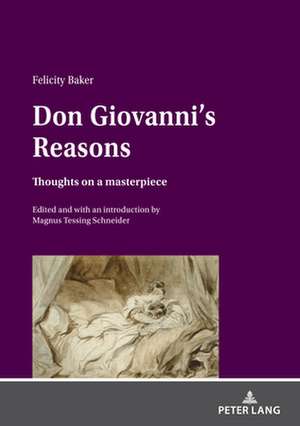Don Giovanni's Reasons: Thoughts on a masterpiece
Autor Magnus Tessing Schneideren Limba Engleză Paperback – 3 mai 2021
Preț: 487.40 lei
Nou
Puncte Express: 731
Preț estimativ în valută:
93.29€ • 101.37$ • 78.42£
93.29€ • 101.37$ • 78.42£
Carte tipărită la comandă
Livrare economică 21 aprilie-05 mai
Preluare comenzi: 021 569.72.76
Specificații
ISBN-13: 9783631817964
ISBN-10: 3631817967
Pagini: 218
Dimensiuni: 148 x 210 mm
Greutate: 0.27 kg
Editura: Peter Lang Copyright AG
ISBN-10: 3631817967
Pagini: 218
Dimensiuni: 148 x 210 mm
Greutate: 0.27 kg
Editura: Peter Lang Copyright AG
Notă biografică
Felicity Baker is a Reader Emeritus in French, University College London, who has published and lectured internationally on eighteenth-century literature since the 1960s. Her main research areas are Lorenzo Da Ponte, Mozart's librettist, and Jean-Jacques Rousseau's philosophy of freedom and equality, his contractual thinking in the Late Enlightenment and its significance today.
Magnus Tessing Schneider holds a PhD from Aarhus University, Denmark, and works as a researcher in theatre studies at Stockholm University. His research centres on the dramaturgy of Italian opera, including the operas of Monteverdi, Gluck, Mozart and Verdi.
Magnus Tessing Schneider holds a PhD from Aarhus University, Denmark, and works as a researcher in theatre studies at Stockholm University. His research centres on the dramaturgy of Italian opera, including the operas of Monteverdi, Gluck, Mozart and Verdi.
Cuprins
Da Ponte - Mozart - Don Giovanni - L'arbore di Diana - Librettos - Rousseau - Antisemitism - Venice - Joseph II - Martín y Soler - Autobiography - Jewish identity - Dante - Don Juan - Enlightenment - Libertinism - Duelling - Critical rewriting - Bizarre - 18th-century literature - Pity - Ruth Berghaus - Opera
Descriere
A collection of seven chapters on Lorenzo Da Ponte's Memorie and his librettos L'arbore di Diana (for Vicente Martin y Soler) and Don Giovanni (for Mozart), the texts are studied as radical works of the Late Enlightenment inspired by Rousseau's socio-political thinking.
